Sustainable Tourism Development in the UK: Principles, Stakeholders, and Macro-Environment Factors
VerifiedAdded on 2023/06/08
|12
|2460
|62
AI Summary
This report explores sustainable tourism development in the UK, covering principles, stakeholders, and macro-environment factors. It discusses the importance of balancing economic, social, and environmental impacts, and the role of stakeholders in decision-making. The report also examines macro-environment factors such as political, economic, social, technological, legal, and environmental factors, and how they contribute to sustainable tourism development. Finally, it looks at competitive micro-environment factors and tourists' motivations for tourism products.
Contribute Materials
Your contribution can guide someone’s learning journey. Share your
documents today.
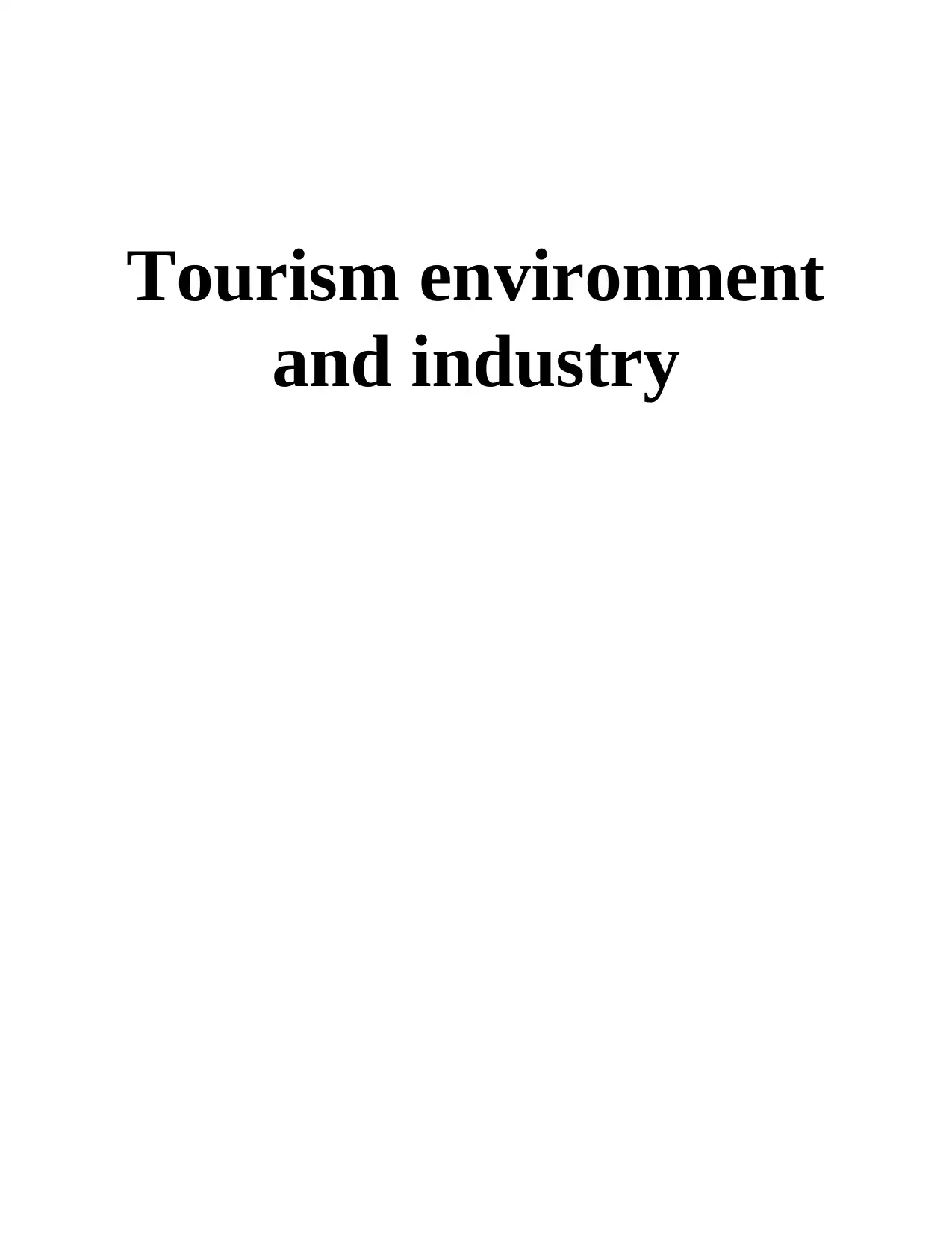
Tourism environment
and industry
and industry
Secure Best Marks with AI Grader
Need help grading? Try our AI Grader for instant feedback on your assignments.
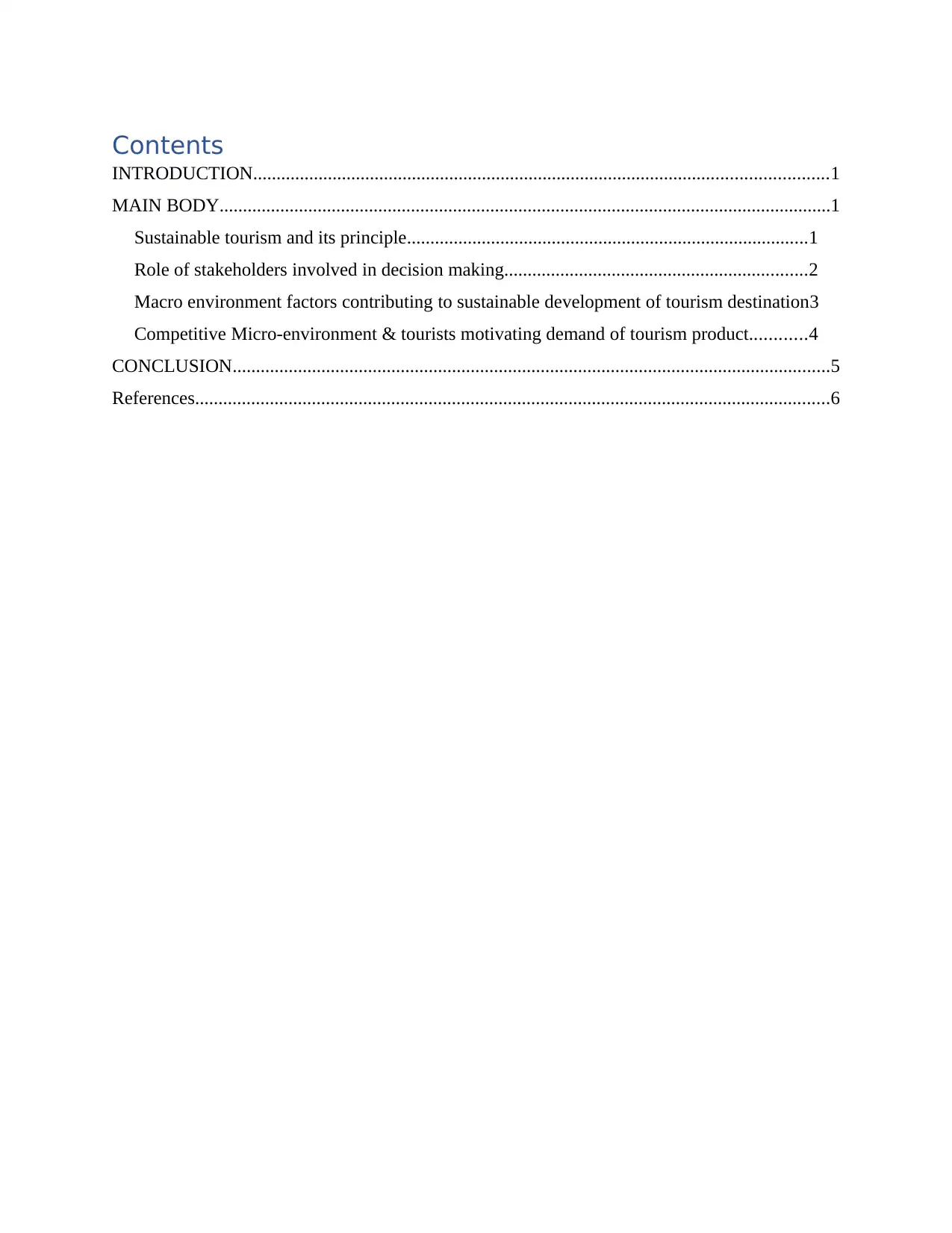
Contents
INTRODUCTION...........................................................................................................................1
MAIN BODY...................................................................................................................................1
Sustainable tourism and its principle......................................................................................1
Role of stakeholders involved in decision making.................................................................2
Macro environment factors contributing to sustainable development of tourism destination3
Competitive Micro-environment & tourists motivating demand of tourism product............4
CONCLUSION................................................................................................................................5
References........................................................................................................................................6
INTRODUCTION...........................................................................................................................1
MAIN BODY...................................................................................................................................1
Sustainable tourism and its principle......................................................................................1
Role of stakeholders involved in decision making.................................................................2
Macro environment factors contributing to sustainable development of tourism destination3
Competitive Micro-environment & tourists motivating demand of tourism product............4
CONCLUSION................................................................................................................................5
References........................................................................................................................................6
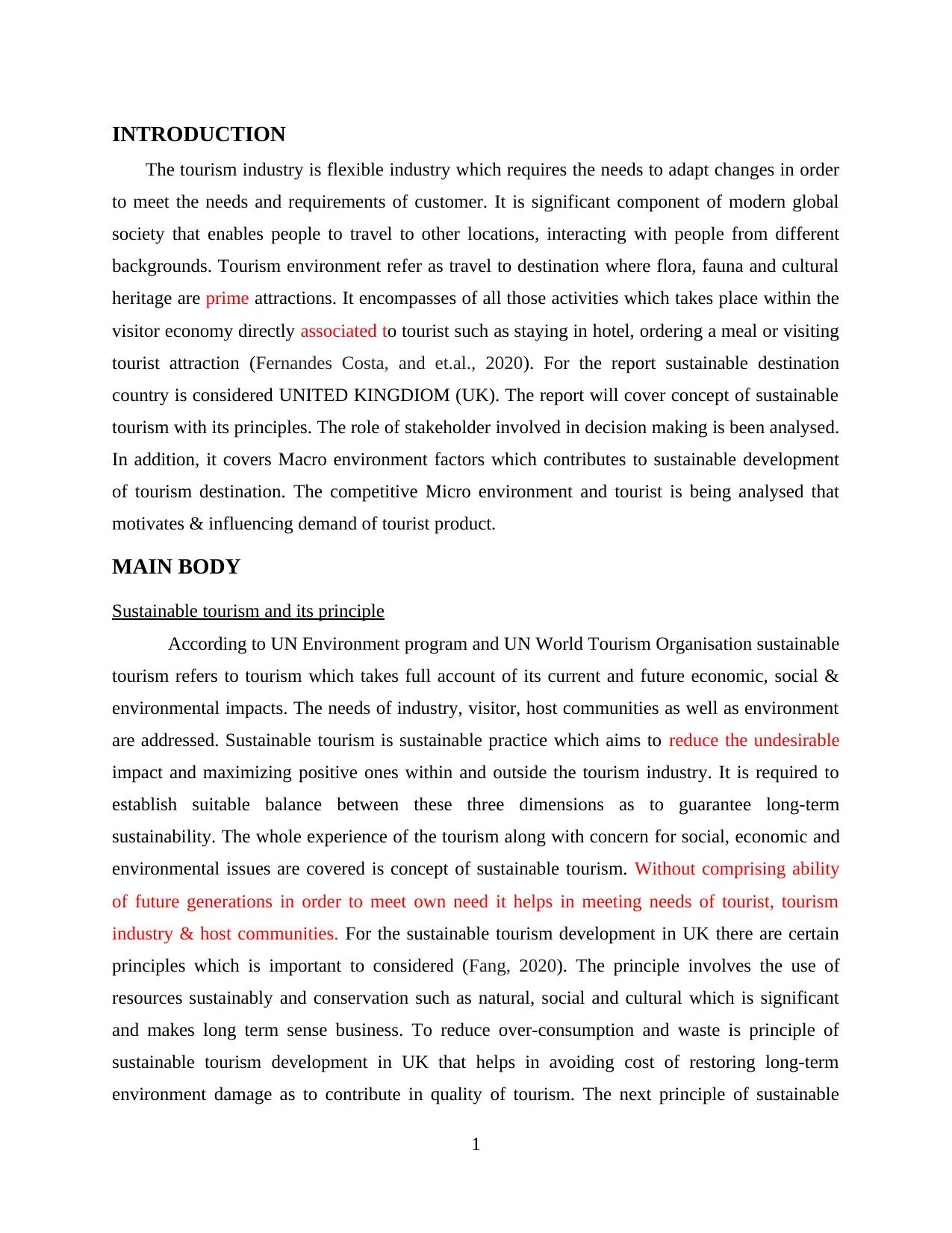
INTRODUCTION
The tourism industry is flexible industry which requires the needs to adapt changes in order
to meet the needs and requirements of customer. It is significant component of modern global
society that enables people to travel to other locations, interacting with people from different
backgrounds. Tourism environment refer as travel to destination where flora, fauna and cultural
heritage are prime attractions. It encompasses of all those activities which takes place within the
visitor economy directly associated to tourist such as staying in hotel, ordering a meal or visiting
tourist attraction (Fernandes Costa, and et.al., 2020). For the report sustainable destination
country is considered UNITED KINGDIOM (UK). The report will cover concept of sustainable
tourism with its principles. The role of stakeholder involved in decision making is been analysed.
In addition, it covers Macro environment factors which contributes to sustainable development
of tourism destination. The competitive Micro environment and tourist is being analysed that
motivates & influencing demand of tourist product.
MAIN BODY
Sustainable tourism and its principle
According to UN Environment program and UN World Tourism Organisation sustainable
tourism refers to tourism which takes full account of its current and future economic, social &
environmental impacts. The needs of industry, visitor, host communities as well as environment
are addressed. Sustainable tourism is sustainable practice which aims to reduce the undesirable
impact and maximizing positive ones within and outside the tourism industry. It is required to
establish suitable balance between these three dimensions as to guarantee long-term
sustainability. The whole experience of the tourism along with concern for social, economic and
environmental issues are covered is concept of sustainable tourism. Without comprising ability
of future generations in order to meet own need it helps in meeting needs of tourist, tourism
industry & host communities. For the sustainable tourism development in UK there are certain
principles which is important to considered (Fang, 2020). The principle involves the use of
resources sustainably and conservation such as natural, social and cultural which is significant
and makes long term sense business. To reduce over-consumption and waste is principle of
sustainable tourism development in UK that helps in avoiding cost of restoring long-term
environment damage as to contribute in quality of tourism. The next principle of sustainable
1
The tourism industry is flexible industry which requires the needs to adapt changes in order
to meet the needs and requirements of customer. It is significant component of modern global
society that enables people to travel to other locations, interacting with people from different
backgrounds. Tourism environment refer as travel to destination where flora, fauna and cultural
heritage are prime attractions. It encompasses of all those activities which takes place within the
visitor economy directly associated to tourist such as staying in hotel, ordering a meal or visiting
tourist attraction (Fernandes Costa, and et.al., 2020). For the report sustainable destination
country is considered UNITED KINGDIOM (UK). The report will cover concept of sustainable
tourism with its principles. The role of stakeholder involved in decision making is been analysed.
In addition, it covers Macro environment factors which contributes to sustainable development
of tourism destination. The competitive Micro environment and tourist is being analysed that
motivates & influencing demand of tourist product.
MAIN BODY
Sustainable tourism and its principle
According to UN Environment program and UN World Tourism Organisation sustainable
tourism refers to tourism which takes full account of its current and future economic, social &
environmental impacts. The needs of industry, visitor, host communities as well as environment
are addressed. Sustainable tourism is sustainable practice which aims to reduce the undesirable
impact and maximizing positive ones within and outside the tourism industry. It is required to
establish suitable balance between these three dimensions as to guarantee long-term
sustainability. The whole experience of the tourism along with concern for social, economic and
environmental issues are covered is concept of sustainable tourism. Without comprising ability
of future generations in order to meet own need it helps in meeting needs of tourist, tourism
industry & host communities. For the sustainable tourism development in UK there are certain
principles which is important to considered (Fang, 2020). The principle involves the use of
resources sustainably and conservation such as natural, social and cultural which is significant
and makes long term sense business. To reduce over-consumption and waste is principle of
sustainable tourism development in UK that helps in avoiding cost of restoring long-term
environment damage as to contribute in quality of tourism. The next principle of sustainable
1
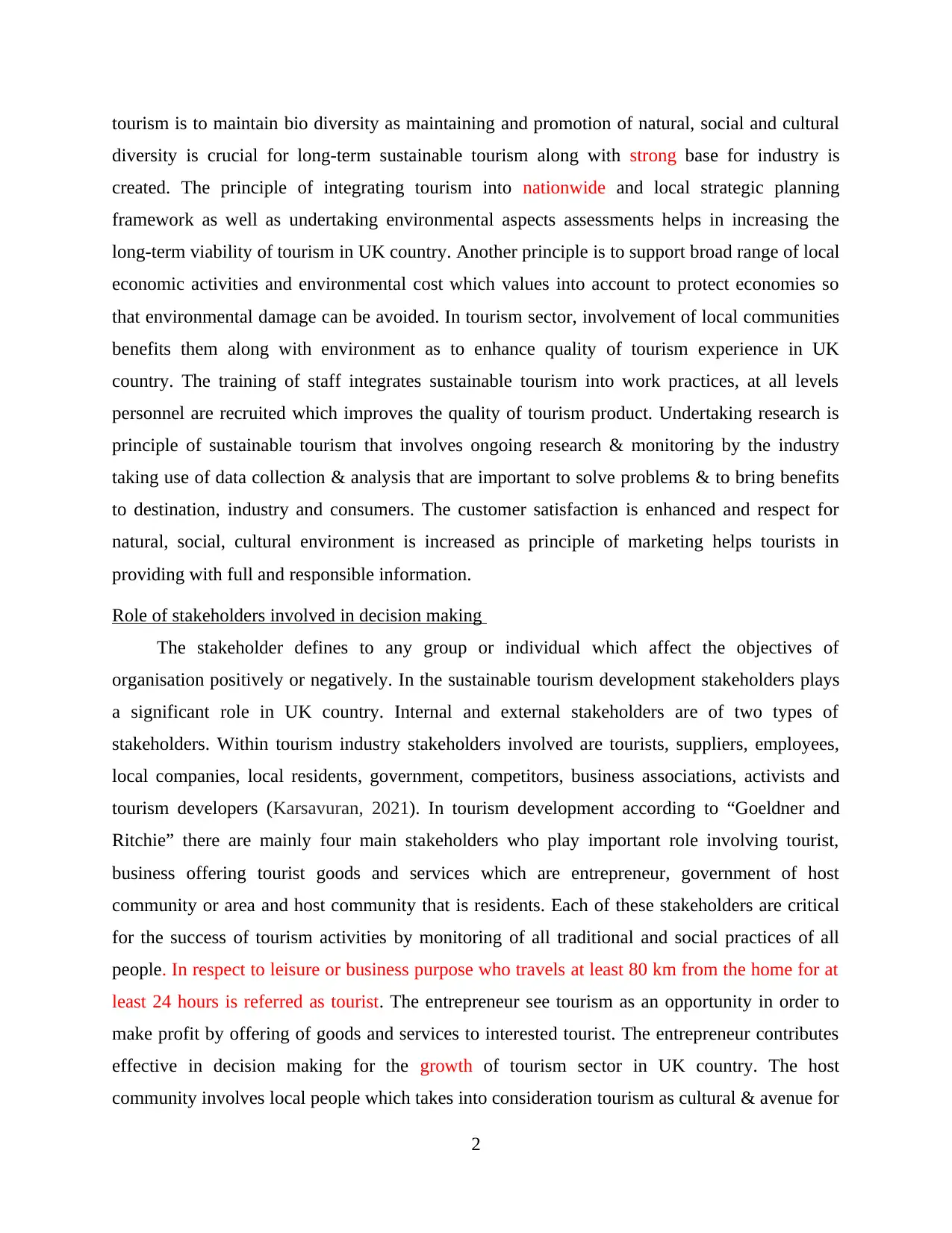
tourism is to maintain bio diversity as maintaining and promotion of natural, social and cultural
diversity is crucial for long-term sustainable tourism along with strong base for industry is
created. The principle of integrating tourism into nationwide and local strategic planning
framework as well as undertaking environmental aspects assessments helps in increasing the
long-term viability of tourism in UK country. Another principle is to support broad range of local
economic activities and environmental cost which values into account to protect economies so
that environmental damage can be avoided. In tourism sector, involvement of local communities
benefits them along with environment as to enhance quality of tourism experience in UK
country. The training of staff integrates sustainable tourism into work practices, at all levels
personnel are recruited which improves the quality of tourism product. Undertaking research is
principle of sustainable tourism that involves ongoing research & monitoring by the industry
taking use of data collection & analysis that are important to solve problems & to bring benefits
to destination, industry and consumers. The customer satisfaction is enhanced and respect for
natural, social, cultural environment is increased as principle of marketing helps tourists in
providing with full and responsible information.
Role of stakeholders involved in decision making
The stakeholder defines to any group or individual which affect the objectives of
organisation positively or negatively. In the sustainable tourism development stakeholders plays
a significant role in UK country. Internal and external stakeholders are of two types of
stakeholders. Within tourism industry stakeholders involved are tourists, suppliers, employees,
local companies, local residents, government, competitors, business associations, activists and
tourism developers (Karsavuran, 2021). In tourism development according to “Goeldner and
Ritchie” there are mainly four main stakeholders who play important role involving tourist,
business offering tourist goods and services which are entrepreneur, government of host
community or area and host community that is residents. Each of these stakeholders are critical
for the success of tourism activities by monitoring of all traditional and social practices of all
people. In respect to leisure or business purpose who travels at least 80 km from the home for at
least 24 hours is referred as tourist. The entrepreneur see tourism as an opportunity in order to
make profit by offering of goods and services to interested tourist. The entrepreneur contributes
effective in decision making for the growth of tourism sector in UK country. The host
community involves local people which takes into consideration tourism as cultural & avenue for
2
diversity is crucial for long-term sustainable tourism along with strong base for industry is
created. The principle of integrating tourism into nationwide and local strategic planning
framework as well as undertaking environmental aspects assessments helps in increasing the
long-term viability of tourism in UK country. Another principle is to support broad range of local
economic activities and environmental cost which values into account to protect economies so
that environmental damage can be avoided. In tourism sector, involvement of local communities
benefits them along with environment as to enhance quality of tourism experience in UK
country. The training of staff integrates sustainable tourism into work practices, at all levels
personnel are recruited which improves the quality of tourism product. Undertaking research is
principle of sustainable tourism that involves ongoing research & monitoring by the industry
taking use of data collection & analysis that are important to solve problems & to bring benefits
to destination, industry and consumers. The customer satisfaction is enhanced and respect for
natural, social, cultural environment is increased as principle of marketing helps tourists in
providing with full and responsible information.
Role of stakeholders involved in decision making
The stakeholder defines to any group or individual which affect the objectives of
organisation positively or negatively. In the sustainable tourism development stakeholders plays
a significant role in UK country. Internal and external stakeholders are of two types of
stakeholders. Within tourism industry stakeholders involved are tourists, suppliers, employees,
local companies, local residents, government, competitors, business associations, activists and
tourism developers (Karsavuran, 2021). In tourism development according to “Goeldner and
Ritchie” there are mainly four main stakeholders who play important role involving tourist,
business offering tourist goods and services which are entrepreneur, government of host
community or area and host community that is residents. Each of these stakeholders are critical
for the success of tourism activities by monitoring of all traditional and social practices of all
people. In respect to leisure or business purpose who travels at least 80 km from the home for at
least 24 hours is referred as tourist. The entrepreneur see tourism as an opportunity in order to
make profit by offering of goods and services to interested tourist. The entrepreneur contributes
effective in decision making for the growth of tourism sector in UK country. The host
community involves local people which takes into consideration tourism as cultural & avenue for
2
Secure Best Marks with AI Grader
Need help grading? Try our AI Grader for instant feedback on your assignments.
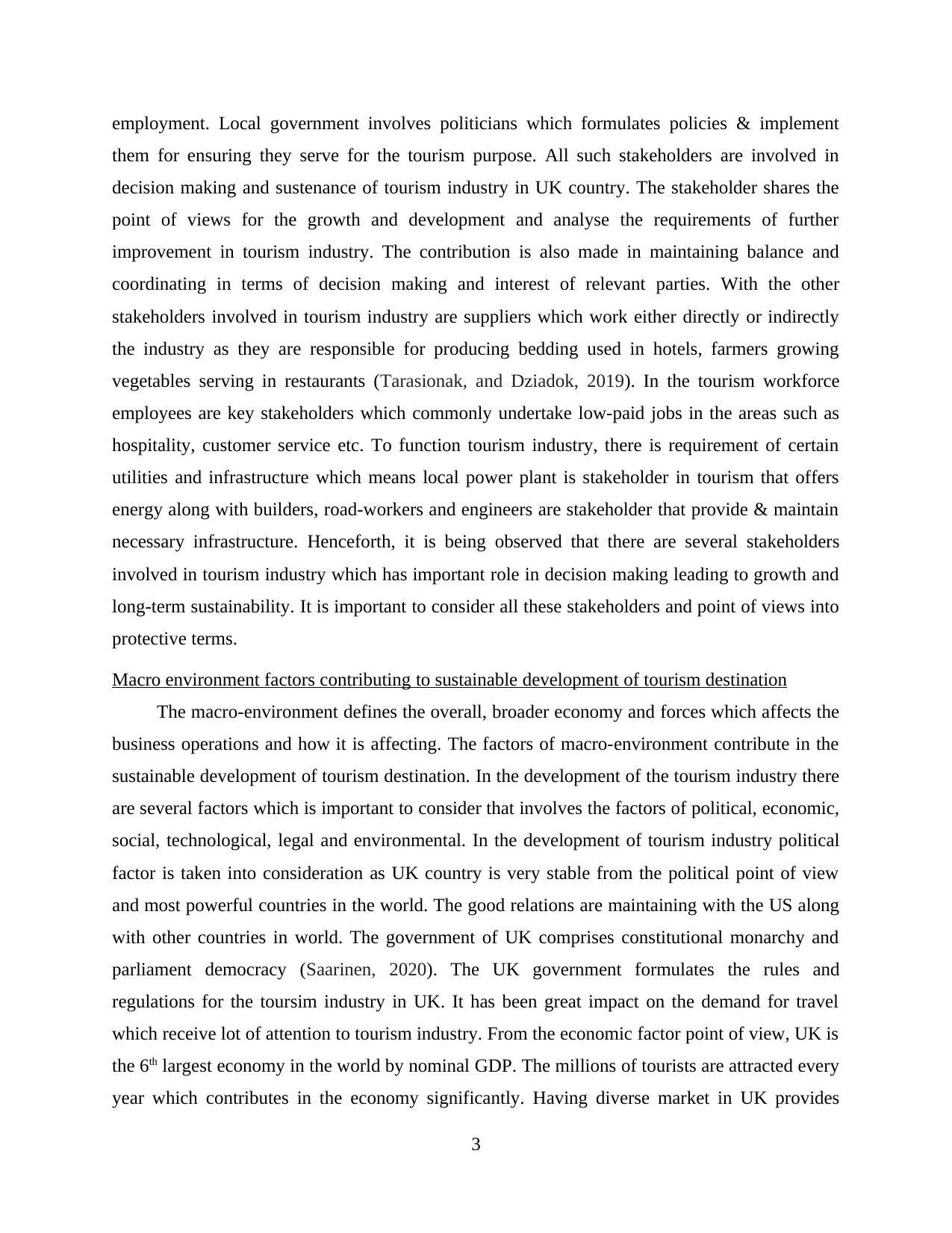
employment. Local government involves politicians which formulates policies & implement
them for ensuring they serve for the tourism purpose. All such stakeholders are involved in
decision making and sustenance of tourism industry in UK country. The stakeholder shares the
point of views for the growth and development and analyse the requirements of further
improvement in tourism industry. The contribution is also made in maintaining balance and
coordinating in terms of decision making and interest of relevant parties. With the other
stakeholders involved in tourism industry are suppliers which work either directly or indirectly
the industry as they are responsible for producing bedding used in hotels, farmers growing
vegetables serving in restaurants (Tarasionak, and Dziadok, 2019). In the tourism workforce
employees are key stakeholders which commonly undertake low-paid jobs in the areas such as
hospitality, customer service etc. To function tourism industry, there is requirement of certain
utilities and infrastructure which means local power plant is stakeholder in tourism that offers
energy along with builders, road-workers and engineers are stakeholder that provide & maintain
necessary infrastructure. Henceforth, it is being observed that there are several stakeholders
involved in tourism industry which has important role in decision making leading to growth and
long-term sustainability. It is important to consider all these stakeholders and point of views into
protective terms.
Macro environment factors contributing to sustainable development of tourism destination
The macro-environment defines the overall, broader economy and forces which affects the
business operations and how it is affecting. The factors of macro-environment contribute in the
sustainable development of tourism destination. In the development of the tourism industry there
are several factors which is important to consider that involves the factors of political, economic,
social, technological, legal and environmental. In the development of tourism industry political
factor is taken into consideration as UK country is very stable from the political point of view
and most powerful countries in the world. The good relations are maintaining with the US along
with other countries in world. The government of UK comprises constitutional monarchy and
parliament democracy (Saarinen, 2020). The UK government formulates the rules and
regulations for the toursim industry in UK. It has been great impact on the demand for travel
which receive lot of attention to tourism industry. From the economic factor point of view, UK is
the 6th largest economy in the world by nominal GDP. The millions of tourists are attracted every
year which contributes in the economy significantly. Having diverse market in UK provides
3
them for ensuring they serve for the tourism purpose. All such stakeholders are involved in
decision making and sustenance of tourism industry in UK country. The stakeholder shares the
point of views for the growth and development and analyse the requirements of further
improvement in tourism industry. The contribution is also made in maintaining balance and
coordinating in terms of decision making and interest of relevant parties. With the other
stakeholders involved in tourism industry are suppliers which work either directly or indirectly
the industry as they are responsible for producing bedding used in hotels, farmers growing
vegetables serving in restaurants (Tarasionak, and Dziadok, 2019). In the tourism workforce
employees are key stakeholders which commonly undertake low-paid jobs in the areas such as
hospitality, customer service etc. To function tourism industry, there is requirement of certain
utilities and infrastructure which means local power plant is stakeholder in tourism that offers
energy along with builders, road-workers and engineers are stakeholder that provide & maintain
necessary infrastructure. Henceforth, it is being observed that there are several stakeholders
involved in tourism industry which has important role in decision making leading to growth and
long-term sustainability. It is important to consider all these stakeholders and point of views into
protective terms.
Macro environment factors contributing to sustainable development of tourism destination
The macro-environment defines the overall, broader economy and forces which affects the
business operations and how it is affecting. The factors of macro-environment contribute in the
sustainable development of tourism destination. In the development of the tourism industry there
are several factors which is important to consider that involves the factors of political, economic,
social, technological, legal and environmental. In the development of tourism industry political
factor is taken into consideration as UK country is very stable from the political point of view
and most powerful countries in the world. The good relations are maintaining with the US along
with other countries in world. The government of UK comprises constitutional monarchy and
parliament democracy (Saarinen, 2020). The UK government formulates the rules and
regulations for the toursim industry in UK. It has been great impact on the demand for travel
which receive lot of attention to tourism industry. From the economic factor point of view, UK is
the 6th largest economy in the world by nominal GDP. The millions of tourists are attracted every
year which contributes in the economy significantly. Having diverse market in UK provides
3
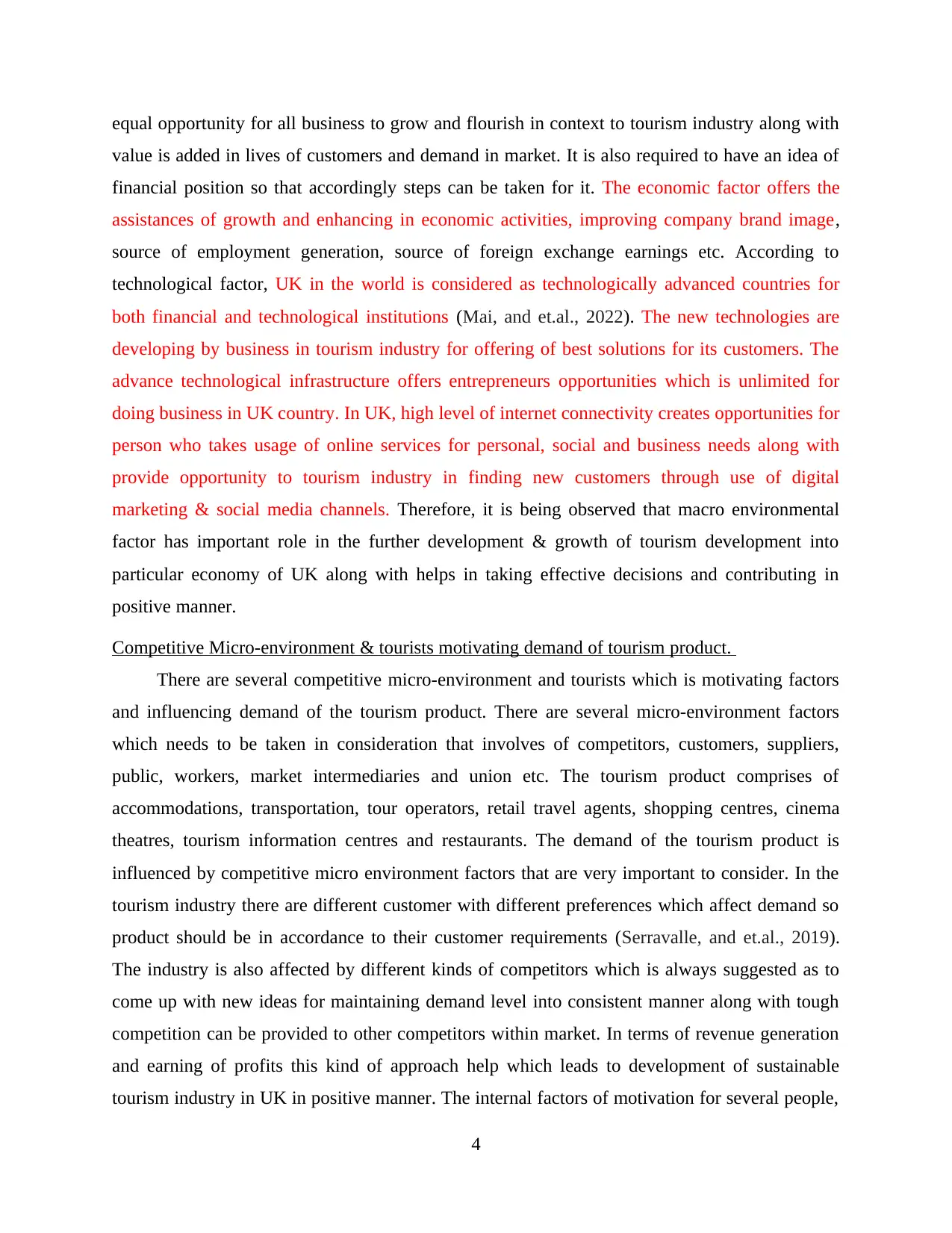
equal opportunity for all business to grow and flourish in context to tourism industry along with
value is added in lives of customers and demand in market. It is also required to have an idea of
financial position so that accordingly steps can be taken for it. The economic factor offers the
assistances of growth and enhancing in economic activities, improving company brand image,
source of employment generation, source of foreign exchange earnings etc. According to
technological factor, UK in the world is considered as technologically advanced countries for
both financial and technological institutions (Mai, and et.al., 2022). The new technologies are
developing by business in tourism industry for offering of best solutions for its customers. The
advance technological infrastructure offers entrepreneurs opportunities which is unlimited for
doing business in UK country. In UK, high level of internet connectivity creates opportunities for
person who takes usage of online services for personal, social and business needs along with
provide opportunity to tourism industry in finding new customers through use of digital
marketing & social media channels. Therefore, it is being observed that macro environmental
factor has important role in the further development & growth of tourism development into
particular economy of UK along with helps in taking effective decisions and contributing in
positive manner.
Competitive Micro-environment & tourists motivating demand of tourism product.
There are several competitive micro-environment and tourists which is motivating factors
and influencing demand of the tourism product. There are several micro-environment factors
which needs to be taken in consideration that involves of competitors, customers, suppliers,
public, workers, market intermediaries and union etc. The tourism product comprises of
accommodations, transportation, tour operators, retail travel agents, shopping centres, cinema
theatres, tourism information centres and restaurants. The demand of the tourism product is
influenced by competitive micro environment factors that are very important to consider. In the
tourism industry there are different customer with different preferences which affect demand so
product should be in accordance to their customer requirements (Serravalle, and et.al., 2019).
The industry is also affected by different kinds of competitors which is always suggested as to
come up with new ideas for maintaining demand level into consistent manner along with tough
competition can be provided to other competitors within market. In terms of revenue generation
and earning of profits this kind of approach help which leads to development of sustainable
tourism industry in UK in positive manner. The internal factors of motivation for several people,
4
value is added in lives of customers and demand in market. It is also required to have an idea of
financial position so that accordingly steps can be taken for it. The economic factor offers the
assistances of growth and enhancing in economic activities, improving company brand image,
source of employment generation, source of foreign exchange earnings etc. According to
technological factor, UK in the world is considered as technologically advanced countries for
both financial and technological institutions (Mai, and et.al., 2022). The new technologies are
developing by business in tourism industry for offering of best solutions for its customers. The
advance technological infrastructure offers entrepreneurs opportunities which is unlimited for
doing business in UK country. In UK, high level of internet connectivity creates opportunities for
person who takes usage of online services for personal, social and business needs along with
provide opportunity to tourism industry in finding new customers through use of digital
marketing & social media channels. Therefore, it is being observed that macro environmental
factor has important role in the further development & growth of tourism development into
particular economy of UK along with helps in taking effective decisions and contributing in
positive manner.
Competitive Micro-environment & tourists motivating demand of tourism product.
There are several competitive micro-environment and tourists which is motivating factors
and influencing demand of the tourism product. There are several micro-environment factors
which needs to be taken in consideration that involves of competitors, customers, suppliers,
public, workers, market intermediaries and union etc. The tourism product comprises of
accommodations, transportation, tour operators, retail travel agents, shopping centres, cinema
theatres, tourism information centres and restaurants. The demand of the tourism product is
influenced by competitive micro environment factors that are very important to consider. In the
tourism industry there are different customer with different preferences which affect demand so
product should be in accordance to their customer requirements (Serravalle, and et.al., 2019).
The industry is also affected by different kinds of competitors which is always suggested as to
come up with new ideas for maintaining demand level into consistent manner along with tough
competition can be provided to other competitors within market. In terms of revenue generation
and earning of profits this kind of approach help which leads to development of sustainable
tourism industry in UK in positive manner. The internal factors of motivation for several people,
4
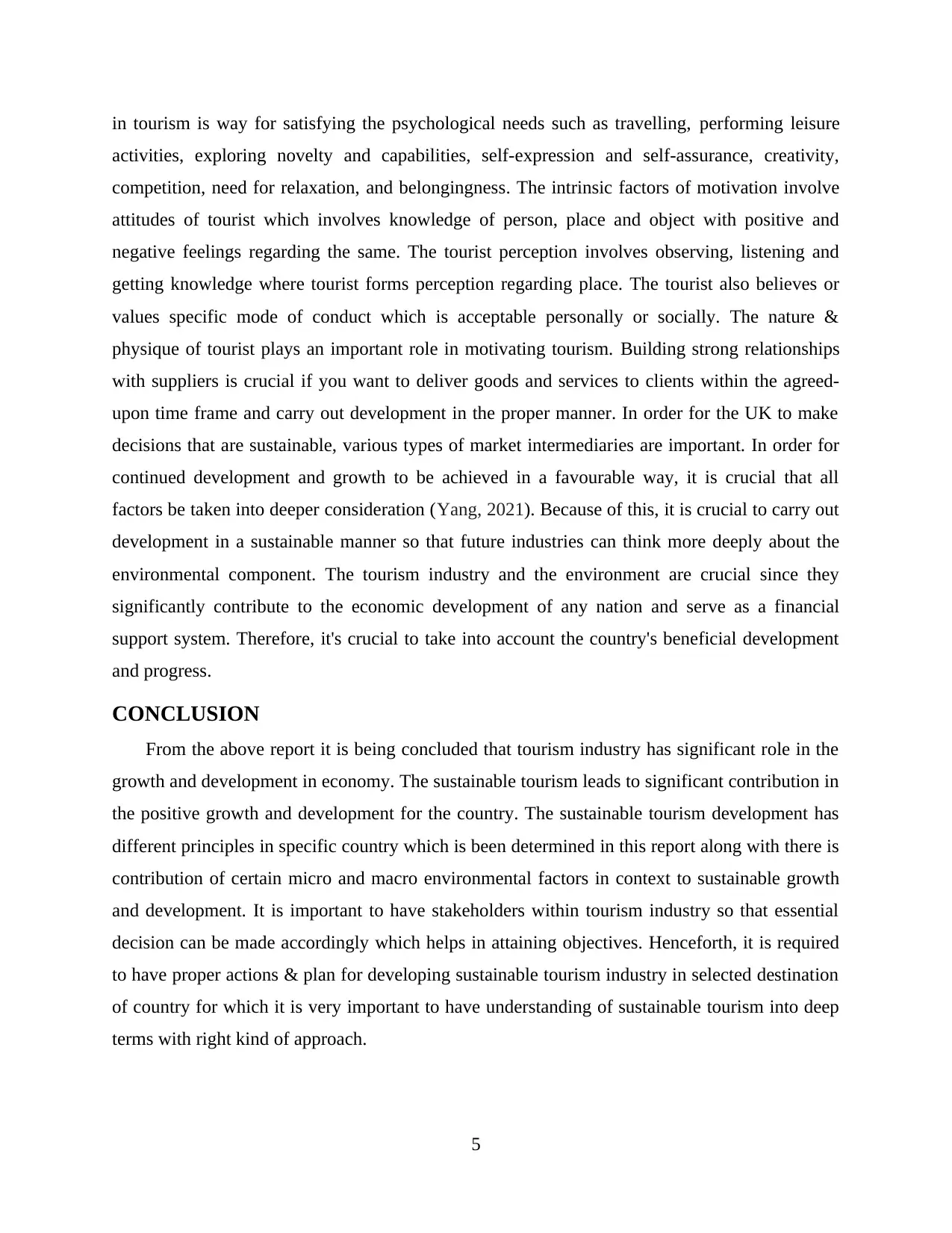
in tourism is way for satisfying the psychological needs such as travelling, performing leisure
activities, exploring novelty and capabilities, self-expression and self-assurance, creativity,
competition, need for relaxation, and belongingness. The intrinsic factors of motivation involve
attitudes of tourist which involves knowledge of person, place and object with positive and
negative feelings regarding the same. The tourist perception involves observing, listening and
getting knowledge where tourist forms perception regarding place. The tourist also believes or
values specific mode of conduct which is acceptable personally or socially. The nature &
physique of tourist plays an important role in motivating tourism. Building strong relationships
with suppliers is crucial if you want to deliver goods and services to clients within the agreed-
upon time frame and carry out development in the proper manner. In order for the UK to make
decisions that are sustainable, various types of market intermediaries are important. In order for
continued development and growth to be achieved in a favourable way, it is crucial that all
factors be taken into deeper consideration (Yang, 2021). Because of this, it is crucial to carry out
development in a sustainable manner so that future industries can think more deeply about the
environmental component. The tourism industry and the environment are crucial since they
significantly contribute to the economic development of any nation and serve as a financial
support system. Therefore, it's crucial to take into account the country's beneficial development
and progress.
CONCLUSION
From the above report it is being concluded that tourism industry has significant role in the
growth and development in economy. The sustainable tourism leads to significant contribution in
the positive growth and development for the country. The sustainable tourism development has
different principles in specific country which is been determined in this report along with there is
contribution of certain micro and macro environmental factors in context to sustainable growth
and development. It is important to have stakeholders within tourism industry so that essential
decision can be made accordingly which helps in attaining objectives. Henceforth, it is required
to have proper actions & plan for developing sustainable tourism industry in selected destination
of country for which it is very important to have understanding of sustainable tourism into deep
terms with right kind of approach.
5
activities, exploring novelty and capabilities, self-expression and self-assurance, creativity,
competition, need for relaxation, and belongingness. The intrinsic factors of motivation involve
attitudes of tourist which involves knowledge of person, place and object with positive and
negative feelings regarding the same. The tourist perception involves observing, listening and
getting knowledge where tourist forms perception regarding place. The tourist also believes or
values specific mode of conduct which is acceptable personally or socially. The nature &
physique of tourist plays an important role in motivating tourism. Building strong relationships
with suppliers is crucial if you want to deliver goods and services to clients within the agreed-
upon time frame and carry out development in the proper manner. In order for the UK to make
decisions that are sustainable, various types of market intermediaries are important. In order for
continued development and growth to be achieved in a favourable way, it is crucial that all
factors be taken into deeper consideration (Yang, 2021). Because of this, it is crucial to carry out
development in a sustainable manner so that future industries can think more deeply about the
environmental component. The tourism industry and the environment are crucial since they
significantly contribute to the economic development of any nation and serve as a financial
support system. Therefore, it's crucial to take into account the country's beneficial development
and progress.
CONCLUSION
From the above report it is being concluded that tourism industry has significant role in the
growth and development in economy. The sustainable tourism leads to significant contribution in
the positive growth and development for the country. The sustainable tourism development has
different principles in specific country which is been determined in this report along with there is
contribution of certain micro and macro environmental factors in context to sustainable growth
and development. It is important to have stakeholders within tourism industry so that essential
decision can be made accordingly which helps in attaining objectives. Henceforth, it is required
to have proper actions & plan for developing sustainable tourism industry in selected destination
of country for which it is very important to have understanding of sustainable tourism into deep
terms with right kind of approach.
5
Paraphrase This Document
Need a fresh take? Get an instant paraphrase of this document with our AI Paraphraser
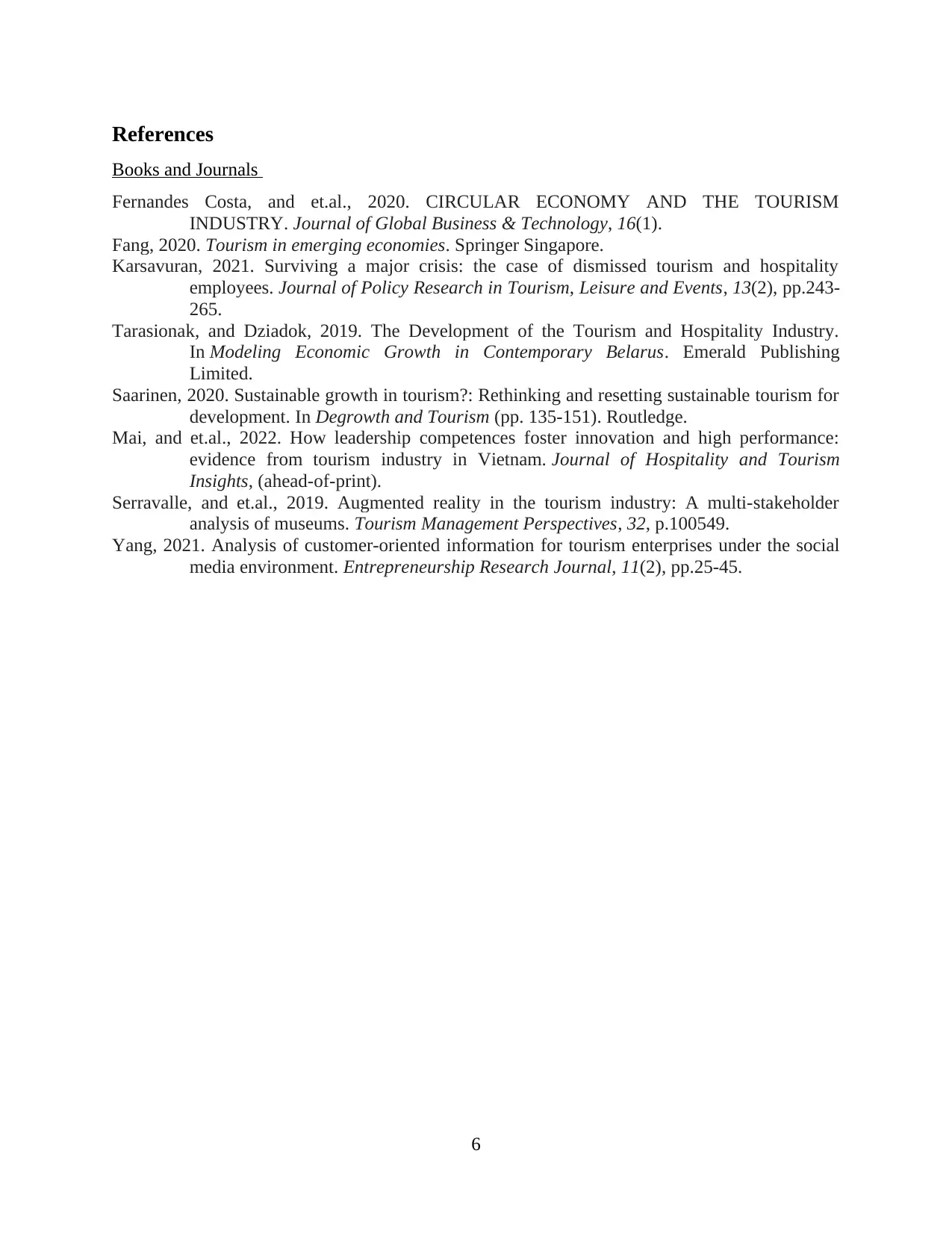
References
Books and Journals
Fernandes Costa, and et.al., 2020. CIRCULAR ECONOMY AND THE TOURISM
INDUSTRY. Journal of Global Business & Technology, 16(1).
Fang, 2020. Tourism in emerging economies. Springer Singapore.
Karsavuran, 2021. Surviving a major crisis: the case of dismissed tourism and hospitality
employees. Journal of Policy Research in Tourism, Leisure and Events, 13(2), pp.243-
265.
Tarasionak, and Dziadok, 2019. The Development of the Tourism and Hospitality Industry.
In Modeling Economic Growth in Contemporary Belarus. Emerald Publishing
Limited.
Saarinen, 2020. Sustainable growth in tourism?: Rethinking and resetting sustainable tourism for
development. In Degrowth and Tourism (pp. 135-151). Routledge.
Mai, and et.al., 2022. How leadership competences foster innovation and high performance:
evidence from tourism industry in Vietnam. Journal of Hospitality and Tourism
Insights, (ahead-of-print).
Serravalle, and et.al., 2019. Augmented reality in the tourism industry: A multi-stakeholder
analysis of museums. Tourism Management Perspectives, 32, p.100549.
Yang, 2021. Analysis of customer-oriented information for tourism enterprises under the social
media environment. Entrepreneurship Research Journal, 11(2), pp.25-45.
6
Books and Journals
Fernandes Costa, and et.al., 2020. CIRCULAR ECONOMY AND THE TOURISM
INDUSTRY. Journal of Global Business & Technology, 16(1).
Fang, 2020. Tourism in emerging economies. Springer Singapore.
Karsavuran, 2021. Surviving a major crisis: the case of dismissed tourism and hospitality
employees. Journal of Policy Research in Tourism, Leisure and Events, 13(2), pp.243-
265.
Tarasionak, and Dziadok, 2019. The Development of the Tourism and Hospitality Industry.
In Modeling Economic Growth in Contemporary Belarus. Emerald Publishing
Limited.
Saarinen, 2020. Sustainable growth in tourism?: Rethinking and resetting sustainable tourism for
development. In Degrowth and Tourism (pp. 135-151). Routledge.
Mai, and et.al., 2022. How leadership competences foster innovation and high performance:
evidence from tourism industry in Vietnam. Journal of Hospitality and Tourism
Insights, (ahead-of-print).
Serravalle, and et.al., 2019. Augmented reality in the tourism industry: A multi-stakeholder
analysis of museums. Tourism Management Perspectives, 32, p.100549.
Yang, 2021. Analysis of customer-oriented information for tourism enterprises under the social
media environment. Entrepreneurship Research Journal, 11(2), pp.25-45.
6

7

8
Secure Best Marks with AI Grader
Need help grading? Try our AI Grader for instant feedback on your assignments.

9

10
1 out of 12
Related Documents
Your All-in-One AI-Powered Toolkit for Academic Success.
+13062052269
info@desklib.com
Available 24*7 on WhatsApp / Email
![[object Object]](/_next/static/media/star-bottom.7253800d.svg)
Unlock your academic potential
© 2024 | Zucol Services PVT LTD | All rights reserved.




